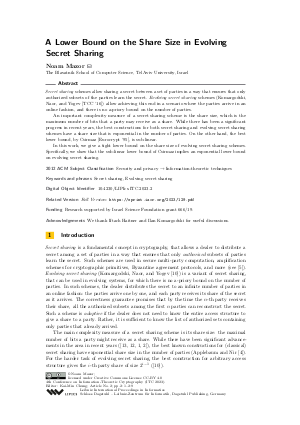A Lower Bound on the Share Size in Evolving Secret Sharing
Author Noam Mazor
-
Part of:
Volume:
4th Conference on Information-Theoretic Cryptography (ITC 2023)
Part of: Series: Leibniz International Proceedings in Informatics (LIPIcs)
Part of: Conference: Conference on Information-Theoretic Cryptography (ITC) - License:
 Creative Commons Attribution 4.0 International license
Creative Commons Attribution 4.0 International license
- Publication Date: 2023-07-21
File

PDF
LIPIcs.ITC.2023.2.pdf
- Filesize: 0.56 MB
- 9 pages
Document Identifiers
Related Versions
- Full Version https://eprint.iacr.org/2023/129.pdf
Subject Classification
ACM Subject Classification
- Security and privacy → Information-theoretic techniques
Keywords
- Secret sharing
- Evolving secret sharing
Metrics
- Access Statistics
-
Total Accesses (updated on a weekly basis)
0PDF Downloads0Metadata Views
Abstract
Secret sharing schemes allow sharing a secret between a set of parties in a way that ensures that only authorized subsets of the parties learn the secret. Evolving secret sharing schemes (Komargodski, Naor, and Yogev [TCC '16]) allow achieving this end in a scenario where the parties arrive in an online fashion, and there is no a-priory bound on the number of parties. An important complexity measure of a secret sharing scheme is the share size, which is the maximum number of bits that a party may receive as a share. While there has been a significant progress in recent years, the best constructions for both secret sharing and evolving secret sharing schemes have a share size that is exponential in the number of parties. On the other hand, the best lower bound, by Csirmaz [Eurocrypt '95], is sub-linear. In this work, we give a tight lower bound on the share size of evolving secret sharing schemes. Specifically, we show that the sub-linear lower bound of Csirmaz implies an exponential lower bound on evolving secret sharing.
Cite As Get BibTex
Noam Mazor. A Lower Bound on the Share Size in Evolving Secret Sharing. In 4th Conference on Information-Theoretic Cryptography (ITC 2023). Leibniz International Proceedings in Informatics (LIPIcs), Volume 267, pp. 2:1-2:9, Schloss Dagstuhl – Leibniz-Zentrum für Informatik (2023)
https://doi.org/10.4230/LIPIcs.ITC.2023.2
BibTex
@InProceedings{mazor:LIPIcs.ITC.2023.2,
author = {Mazor, Noam},
title = {{A Lower Bound on the Share Size in Evolving Secret Sharing}},
booktitle = {4th Conference on Information-Theoretic Cryptography (ITC 2023)},
pages = {2:1--2:9},
series = {Leibniz International Proceedings in Informatics (LIPIcs)},
ISBN = {978-3-95977-271-6},
ISSN = {1868-8969},
year = {2023},
volume = {267},
editor = {Chung, Kai-Min},
publisher = {Schloss Dagstuhl -- Leibniz-Zentrum f{\"u}r Informatik},
address = {Dagstuhl, Germany},
URL = {https://drops.dagstuhl.de/entities/document/10.4230/LIPIcs.ITC.2023.2},
URN = {urn:nbn:de:0030-drops-183300},
doi = {10.4230/LIPIcs.ITC.2023.2},
annote = {Keywords: Secret sharing, Evolving secret sharing}
}
Author Details
Funding
Research supported by Israel Science Foundation grant 666/19.
Acknowledgements
We thank Iftach Haitner and Ilan Komargodski for useful discussions.
References
-
Benny Applebaum, Amos Beimel, Oriol Farràs, Oded Nir, and Naty Peter. Secret-sharing schemes for general and uniform access structures. In Annual International Conference on the Theory and Applications of Cryptographic Techniques, pages 441-471. Springer, 2019.

-
Benny Applebaum, Amos Beimel, Oded Nir, and Naty Peter. Better secret sharing via robust conditional disclosure of secrets. In Proceedings of the 52nd Annual ACM SIGACT Symposium on Theory of Computing, pages 280-293, 2020.

-
Benny Applebaum, Amos Beimel, Oded Nir, Naty Peter, and Toniann Pitassi. Secret sharing, slice formulas, and monotone real circuits. In 13th Innovations in Theoretical Computer Science Conference (ITCS 2022). Schloss Dagstuhl-Leibniz-Zentrum für Informatik, 2022.

-
Benny Applebaum and Oded Nir. Upslices, downslices, and secret-sharing with complexity of 1. 5 n. In Advances in Cryptology-CRYPTO 2021: 41st Annual International Cryptology Conference, CRYPTO 2021, Virtual Event, August 16-20, 2021, Proceedings, Part III, pages 627-655, 2021.

-
Amos Beimel. Secret-sharing schemes: A survey. In International conference on coding and cryptology, pages 11-46. Springer, 2011.

-
Amos Beimel and Ilan Orlov. Secret sharing and non-shannon information inequalities. IEEE Transactions on Information Theory, 57(9):5634-5649, 2011.

-
László Csirmaz. The dealer’s random bits in perfect secret sharing schemes. Studia Scientiarum Mathematicarum Hungarica, 32(3):429-438, 1996.

-
László Csirmaz. The size of a share must be large. Journal of cryptology, 10(4):223-231, 1997.

-
László Csirmaz and Gábor Tardos. On-line secret sharing. Designs, Codes and Cryptography, 63(1):127-147, 2012.

-
Ilan Komargodski, Moni Naor, and Eylon Yogev. How to share a secret, infinitely. IEEE Transactions on Information Theory, 64(6):4179-4190, 2017.

-
Ilan Komargodski and Anat Paskin-Cherniavsky. Evolving secret sharing: dynamic thresholds and robustness. In Theory of Cryptography Conference, pages 379-393. Springer, 2017.

-
Tianren Liu and Vinod Vaikuntanathan. Breaking the circuit-size barrier in secret sharing. In Proceedings of the 50th Annual ACM SIGACT Symposium on Theory of Computing, pages 699-708, 2018.

-
Tianren Liu, Vinod Vaikuntanathan, and Hoeteck Wee. Towards breaking the exponential barrier for general secret sharing. In Annual International Conference on the Theory and Applications of Cryptographic Techniques, pages 567-596. Springer, 2018.

-
Anat Paskin-Cherniavsky. How to infinitely share a secret more efficiently. Cryptology ePrint Archive, 2016.

